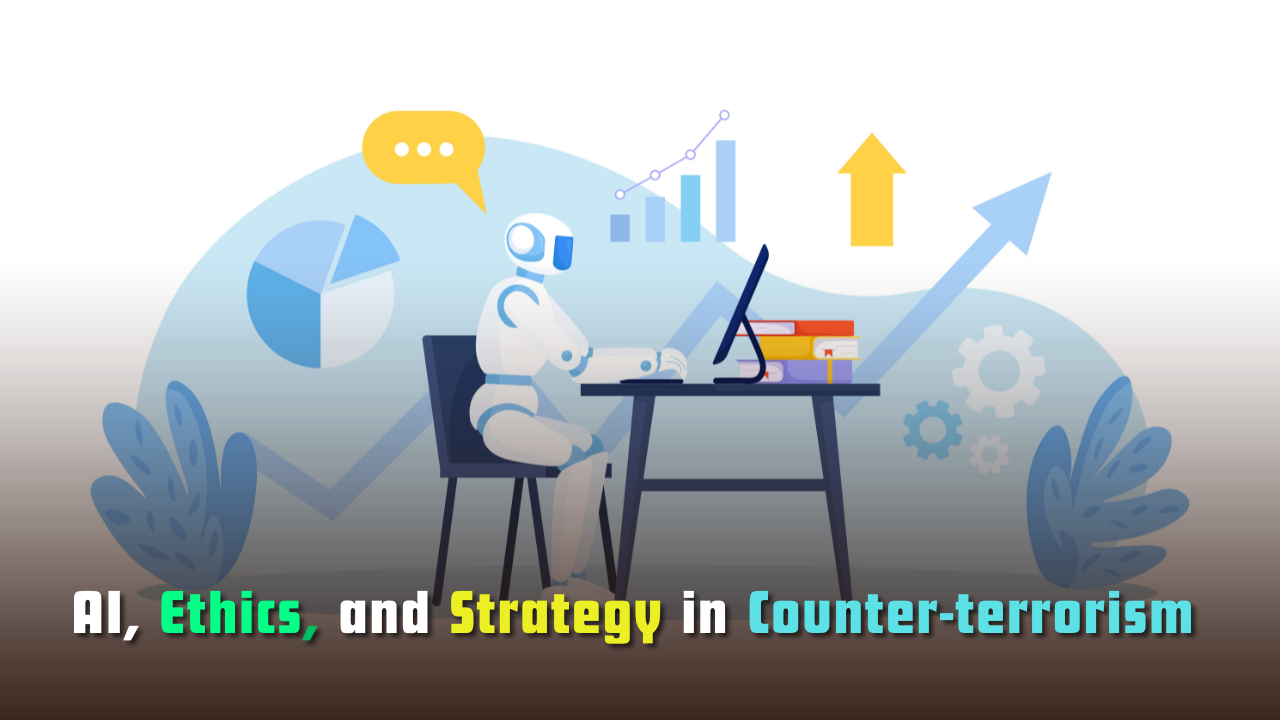AI, Ethics, and Strategy: Rethinking Counter-terrorism
Context: Can AI make India safer without compromising democracy? This essay explores how ethical, legal, and strategic frameworks must guide AI in counter-terrorism.
Introduction
The 21st century has transformed warfare and internal security, largely through the rise of Artificial Intelligence (AI) and other disruptive technologies. Tools like facial recognition, behavioural analysis, drones, and automated surveillance systems now play a central role in modern counter-terrorism. Two key perspectives frame the debate: one supports full AI integration into national security frameworks, especially in countries like India; the other stresses the need for ethical safeguards, strategic foresight, and human control to prevent misuse. Expert insights from the defence sector reinforce both the advantages and challenges of adopting these technologies. While AI promises greater precision and efficiency, it raises serious concerns around control, transparency, and accountability. This essay contends that AI is vital for modern counter-terrorism, but in India it must operate within a robust framework of ethical, legal, and strategic principles to uphold democratic values and avoid repeating past failures.
AI-Security Crossroads for India
India, like many other nations, faces multifaceted terrorist threats—from cross-border infiltration and sleeper cells to online radicalisation. AI-driven tools used by both state and non-state actors have altered internal security dynamics. Military and intelligence agencies, historically responsive to technological change, now follow the global trend of using AI and machine learning to anticipate and neutralise threats. However, this evolution raises serious risks. AI systems can obscure responsibility, amplify hidden biases, and, if left unchecked, fuel authoritarian practices. In “Enhancing Counter-Terrorism Through AI: An India-Centric Strategic Outlook” (ORF, Jul 08, 2025), Soumya Awasthi highlights these concerns, pointing to India’s “limited forensic capability, inter-agency data silos, and inadequate training” as structural weaknesses that could undermine AI’s promise. These challenges demand not just technical upgrades but thoughtful integration of AI into systems governed by legal norms and democratic accountability.
Responsibility Amidst Automation
A key challenge in the use of Artificial Intelligence in counter-terrorism lies in balancing technological capability with ethical responsibility. As AI becomes more integrated into security operations, there is a growing tendency to delegate decision-making to machines, particularly in situations demanding speed and large-scale analysis. However, this raises important concerns regarding legality, proportionality, and the necessity for ongoing human oversight. The effectiveness of AI in diverse national contexts depends not only on technological advancement but also on institutional coordination and the availability of context-specific data, including linguistic and regional variation. While advanced systems may enhance tactical advantages, they cannot replace the need for human judgement and accountability. The use of remote and automated technologies also risks distancing operators from the consequences of their actions, creating a false sense of moral detachment. These issues shift the focus from the question of whether AI should be used to the more pressing concern of how it should be governed within a responsible, accountable, and ethical framework.
Strategy Requires Ethics
Artificial Intelligence plays a crucial role in counter-terrorism, but it must not substitute ethical governance, strategic clarity, or human oversight. Rather than replacing informed policy and moral responsibility, AI should function as an enabling tool within a broader decision-making process. For its deployment to be both effective and legitimate, it must be embedded within a framework shaped by national values and supported by institutional safeguards. In this context, Awasthi (2025) recommends that India adapt its National Mission for AI to specifically address counter-terrorism, internal security, and border management. This approach underscores the importance of aligning AI strategies with the unique demands of democratic governance. Strategy in counter-terrorism, therefore, cannot be reduced to operational efficiency alone. It must also reinforce ethical standards and constitutional principles, ensuring that national security efforts reflect and protect the societal norms and democratic values from which they derive their legitimacy.
Oversight Enables Impact
AI’s benefits become most effective when governed responsibly. Integrated with human oversight and legal safeguards, it can greatly enhance a state’s ability to detect, prevent, and respond to threats. Awasthi (2025) recognises its potential, noting successful applications in predictive policing, drone surveillance, and robotics. AI is also credited with reducing decision fatigue and enhancing situational awareness in high-pressure operations. However, significant risks persist. Flawed data, opaque algorithms, and uncritical automation can lead to misidentification, policy failures, and erosion of civil rights. The illusion of precision may further distance decision-makers from the consequences of their actions. These dangers make clear the need for regulatory structures that prioritise transparency and accountability.
Promise with Caution
With appropriate safeguards, Artificial Intelligence has the potential to transform current challenges in counter-terrorism into strategic advantages—enhancing security while maintaining ethical standards. It allows for a shift from reactive measures to proactive threat identification, improving the speed and coordination of national responses. However, several risks accompany its use. Inaccurate data, embedded biases, and overdependence on automated systems can lead to serious consequences, including misjudgements and rights violations. Furthermore, the perceived precision of digital operations may encourage emotional and ethical detachment from the real-world impact of violence. These concerns highlight the necessity of governing AI within a framework that balances technological efficiency with ethical responsibility, legal accountability, and strategic foresight—ensuring that its use contributes to security without undermining democratic values or human dignity.
Wisdom with Innovation
Artificial Intelligence has become an indispensable component of modern counter-terrorism, offering the promise of greater speed, precision, and adaptability in identifying and neutralising threats. In India’s context, this technological transformation presents both an urgent opportunity and a set of complex challenges.
While AI can strengthen national security, its benefits will only be realised if it is implemented within a carefully constructed framework of ethical responsibility, legal safeguards, and strategic oversight. The risks—ranging from data inaccuracies and algorithmic opacity to the erosion of human accountability—demand that AI not be treated as a shortcut to security, but as a tool requiring constant regulation and reflection.
A technocratic approach, divorced from normative concerns, would risk replicating past failures and eroding public trust. Therefore, as India refines its counter-terrorism strategies, it must prioritise the creation of inclusive, transparent, and value-driven mechanisms that ensure AI serves the broader goals of justice, constitutional integrity, and human dignity.
The future of security will depend not just on innovation, but on the wisdom with which it is governed.
Subscribe to our Youtube Channel for more Valuable Content – TheStudyias
Download the App to Subscribe to our Courses – Thestudyias
The Source’s Authority and Ownership of the Article is Claimed By THE STUDY IAS BY MANIKANT SINGH





